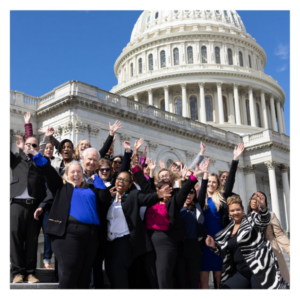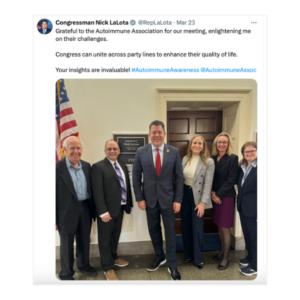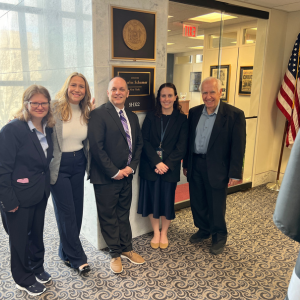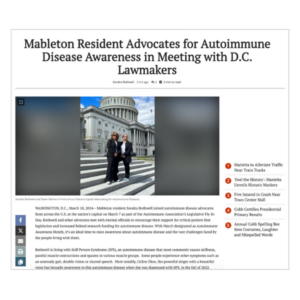Raising Voices on Capitol Hill: Our Inaugural Legislative Fly-In
 This month marked a groundbreaking moment as we hosted our inaugural Legislative Fly-In, an inspiring day in Washington, D.C. where 20 passionate advocates for autoimmune diseases united. Their mission: To champion critical patient-focused legislation and secure increased federal investment in autoimmune disease research. This group, representing the voices of 50 million Americans living with these conditions, shared their personal journeys and advocated for transformative policy reforms.
This month marked a groundbreaking moment as we hosted our inaugural Legislative Fly-In, an inspiring day in Washington, D.C. where 20 passionate advocates for autoimmune diseases united. Their mission: To champion critical patient-focused legislation and secure increased federal investment in autoimmune disease research. This group, representing the voices of 50 million Americans living with these conditions, shared their personal journeys and advocated for transformative policy reforms.
Catch the highlights in our event recap video!
Representing 10 states and a variety of autoimmune diseases and backgrounds, participants engaged with 37 members or staff representatives from both the Senate and the House. They highlighted the escalating prevalence of autoimmune diseases in the U.S., sharing the significant challenges these conditions pose and underscoring the critical need for federal action. The advocates focused on rallying support for two crucial legislative efforts and funding for the Office of Autoimmune Disease Research.
 Support for the Office of Autoimmune Disease Research
Support for the Office of Autoimmune Disease Research
Participants encouraged legislators to fully fund the Office of Autoimmune Disease Research through the National Institutes of Health (NIH) in this appropriations cycle.
The Challenge
Each year, the number of people battling autoimmune diseases grows, touching millions of lives. These chronic diseases, often debilitating and without cures, can impact nearly every organ and strike at any age. Despite the significant toll they exact, research into many autoimmune diseases remains insufficient, and treatment options are limited. The economic burden is staggering, with costs surpassing $168 billion annually—a figure comparable to the combined budgets of the Veterans Administration, the Department of Energy, and NASA. Yet, funding for autoimmunity research within the NIH has not exceeded 3% of its total budget since 2008.
The Solution
The establishment of an Office of Autoimmune Disease Research within the NIH’s Office of Research on Women’s Health in 2022 was a monumental step forward. This office coordinates a strategic, multi-institute research plan, spearheads innovative research, and fosters collaboration across the NIH. Our advocacy underscores the urgent need for continued investment in the health and well-being of millions, affirming that it is a priority that deserves unwavering support across Congress.
 S.1375/H.R.830 – The Help Ensure Lower Patient (HELP) Copays Act
S.1375/H.R.830 – The Help Ensure Lower Patient (HELP) Copays Act
Participants encouraged legislators to co-sponsor S.1375/H.R.830, the Help Ensure Lower Patient (HELP) Copays Act, aiming for its inclusion in the final Pharmacy Benefit Managers (PBM) Reform Package.
The Challenge
Patients are often burdened by high out-of-pocket expenses for medications, despite the availability of copay assistance programs designed to mitigate these costs. However, insurers and PBMs have instituted policies that prevent these benefits from reducing a patient’s deductible or out-of-pocket limit, leading to unexpected and sometimes insurmountable expenses once assistance is exhausted.
The Solution
The HELP Copays Act mandates that health insurance plans recognize third-party financial support as contributions toward patients’ cost-sharing obligations, ending policies that categorize essential medications as “nonessential” and exacerbate financial strain on patients.
S.652/H.R.2630 – The Safe Step Act
Participants encouraged legislators to co-sponsor S.652/H.R.2630, the Safe Step Act, aiming for its inclusion in the final PBM Reform package.
The Challenge
Step therapy protocols can delay access to the most effective treatments, resulting in adverse outcomes for patients, including severe side effects or irreversible disease progression. These protocols often disregard the individual’s unique health needs and medical history.
The Solution
The Safe Step Act proposes critical amendments to ensure that step therapy protocols include an exception process, safeguarding patient access to the right treatments without unnecessary delays or risks.
Positive Outcomes and Wide-Reaching Impact
 The feedback from these meetings was overwhelmingly positive, with advocates feeling empowered by their contributions to the democratic process and the ongoing fight for autoimmune disease awareness. The event has also sparked wider conversations, amplified through social media and local media spotlight, like the inspiring story of Sondra Rothwell in the Marietta Daily Journal.
The feedback from these meetings was overwhelmingly positive, with advocates feeling empowered by their contributions to the democratic process and the ongoing fight for autoimmune disease awareness. The event has also sparked wider conversations, amplified through social media and local media spotlight, like the inspiring story of Sondra Rothwell in the Marietta Daily Journal.
“The global incidence of autoimmunity is on the rise, creating an urgent need to better understand these conditions and develop more efficient methods for their prevention, diagnosis, treatment, and cure. And we must eliminate the barriers that prevent many patients from accessing care and effective treatments. We call upon our Senators and Representatives in Congress to enact federal policies that enhance the health and quality of life for people living with autoimmune diseases,” said Molly Murray, president and CEO of the Autoimmune Association.
Join our email list
Receive the latest blog articles, news, and more right to your inbox!
Related articles you might be interested in

Get Involved During Autoimmune Awareness Month





Autoimmune Association Advocates for Federal Legislation to Reform Harmful PBM Practices





Inflation Reduction Act (IRA) Medicare Drug Price Negotiation List Announced





Understanding Health Insurance Accumulators and Maximizers
Find more resources on autoimmunity
Learn more about autoimmunity, diagnosis tips, how to find a physician, and more.